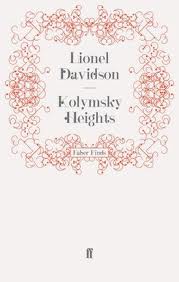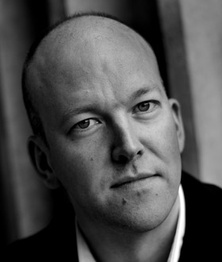Any fan worth their salt will have noticed the recent vast improvement in the availability of classic crime. As the e-book market fast approaches maturity, there has been a bit of a gold-rush on authors previously only discoverable in second-hand bookshops.
I’m a publisher myself, in a different field, so I’m interested in the mechanics of how these projects come about, and the people that make them happen. Hence my recent chat with James Long of Bello, and now this interview with Richard T. Kelly of the Faber Finds imprint.
Faber Finds was founded back in 2008 and is of course part of legendary publishing company Faber and Faber. Richard T. Kelly looks after their list (and is also a biographer and novelist in his own right).
 How did the idea for Faber Finds come about?
How did the idea for Faber Finds come about?
It was the brainchild of Faber’s chief executive Stephen Page who, round about the middle of the last decade, had been having a hard think about the full gamut of cultural/creative possibilities for new publishing technologies. He realised that print-on-demand and ebook offered a way to serve all sorts of discerning niche readerships, ‘little platoons’ of avid readers across all genres; and, crucially, a way to do so in defiance of the usual drear economics of reprinting. So you could make a smart new edition of a cherished but long-unavailable title, such that any keen reader who’d been in search of a particular ‘lost’ classic might now locate it online, at the dedicated Finds site www.faberfinds.co.uk or on Amazon, and whistle it up bespoke. Your readers might be interested in a kind of mission statement that Stephen Page wrote for the Telegraph back at the time of Finds’ launch in May 2008.
Who is making the selections, and how are they going about it?
As editor of Faber Finds I make the formal acquisitions of titles by contracting with authors and/or agents and literary estates. But the list is really informed by the suggestions and recommendations I receive from readers and writers, and general bibliophiles of all stripes. The thing to stress is that Finds is not primarily about my personal tastes as editor: it’s about the myriad tastes of book-lovers out there. And that’s really what is the pleasure of the job for me – chasing down leads for neglected titles given me by their ardent admirers, and making a ‘new’ literary discovery of my own at the end of the hunt. Be it said, I have taken on one or two titles that are especially dear to me; but mainly I will happily publish any book that is of genuine distinction, in whatever genre.
Are all of your selections based on Faber’s backlist?
By no means, in fact only a small percentage of the Finds stock-list (of 1,000 or so titles to date) were previously published by Faber. The real sport – and intrigue, and privilege – of Finds lies in bringing new names and exciting titles into the Faber fold and livery.
Is there any opportunity for people to prompt selections?
As I say, when people want to advocate a neglected book to me with passion then I am all ears. I really couldn’t be keener… Anyone is welcome to email me on that score, to finds@faber.co.uk.
Which genre is proving most successful?
One simply couldn’t ‘call it’ in that way. In fiction I’m glad to say that Crime (for instance authors as different and brilliant as Lionel Davidson and Cyril Hare) and Supernatural (especially the ‘strange stories’ of Robert Aickman) are doing well for us, but then so are neglected works by novelists such as Patrick Hamilton, Angus Wilson and P. H. Newby. In non-fiction we’re enjoying success with everything from Political Biography, History and Military to Pottery, Horticulture and Musical Composition…
How many crime novels are you aiming to revive in this way?
We don’t have a target figure in mind, it’s simple the case that we are always delighted to bring crime writers of distinction onto the list, and certainly I’m excited about what we will shortly be revealing for 2013.
 Have you got any favorites from the crime list?
Have you got any favorites from the crime list?
I don’t speak of favourites since my affections are spread equally around the list. I do like to draw attention to Lionel Davidson, though, because his thrillers were such rich and ambitious productions, not least Kolymsky Heights, his final novel, which came to Finds at the recommendation of Philip Pullman.
How are the books created – are they scanned from originals or re-set?
The body text is scanned line-by-line from the best available extant original. Where the author is living, or the estate is willing, I like to add new prefatory material to our Finds editions, perhaps a new author intro or Q&A, or else an appreciation by a literary admirer; and this new material is set in-house and inserted in the prelims or endpapers.
What are your print runs?
The list is print-on-demand, so it’s a bespoke business, no print runs other than the occasional ‘short run’ to cater for sales at a dedicated event or book festival or somesuch.
Why did you opt for a generic cover rather than reproducing original covers or creating new ones?
It’s a minor regret for me, since all lovers of old books have a soft spot for the covers of old books… But the economics of a list of this kind mean that you need a generic cover design rather than repro or origination. What I like especially about our Finds look is that it bears a family resemblance to a tradition of Faber design, particularly in respect of Faber’s poetry ‘look’. I also like to think there’s a design affinity with the ‘Collection Blanche’ of Gallimard, but that’s a personal fetish of mine…
Have there been any unexpected difficulties?
There were a handful of faulty editions produced in the first year of Finds’ operations in 2008, this as a result of bad scanning. We’ve corrected these as soon as we’ve been made aware, and we changed printers as a consequence, since when – certainly since I took over the list in early 2011 – we haven’t had any new difficulties of this kind, I’m happy to say. Other than that niggle, I have to say the process has been altogether delightful, and also, for me as a reader, inspiring in many ways.

Past Offences by Rich Westwood is licensed under a Creative Commons Attribution-NonCommercial-NoDerivs 3.0 Unported License.




Rich – This is great information – and interesting! Thanks for taking the time to do this interview and share it. Thanks to Mr. Kelly, too.
LikeLike
Very interesting – must go and look at their list….
LikeLike